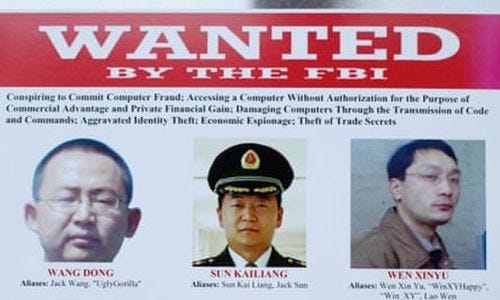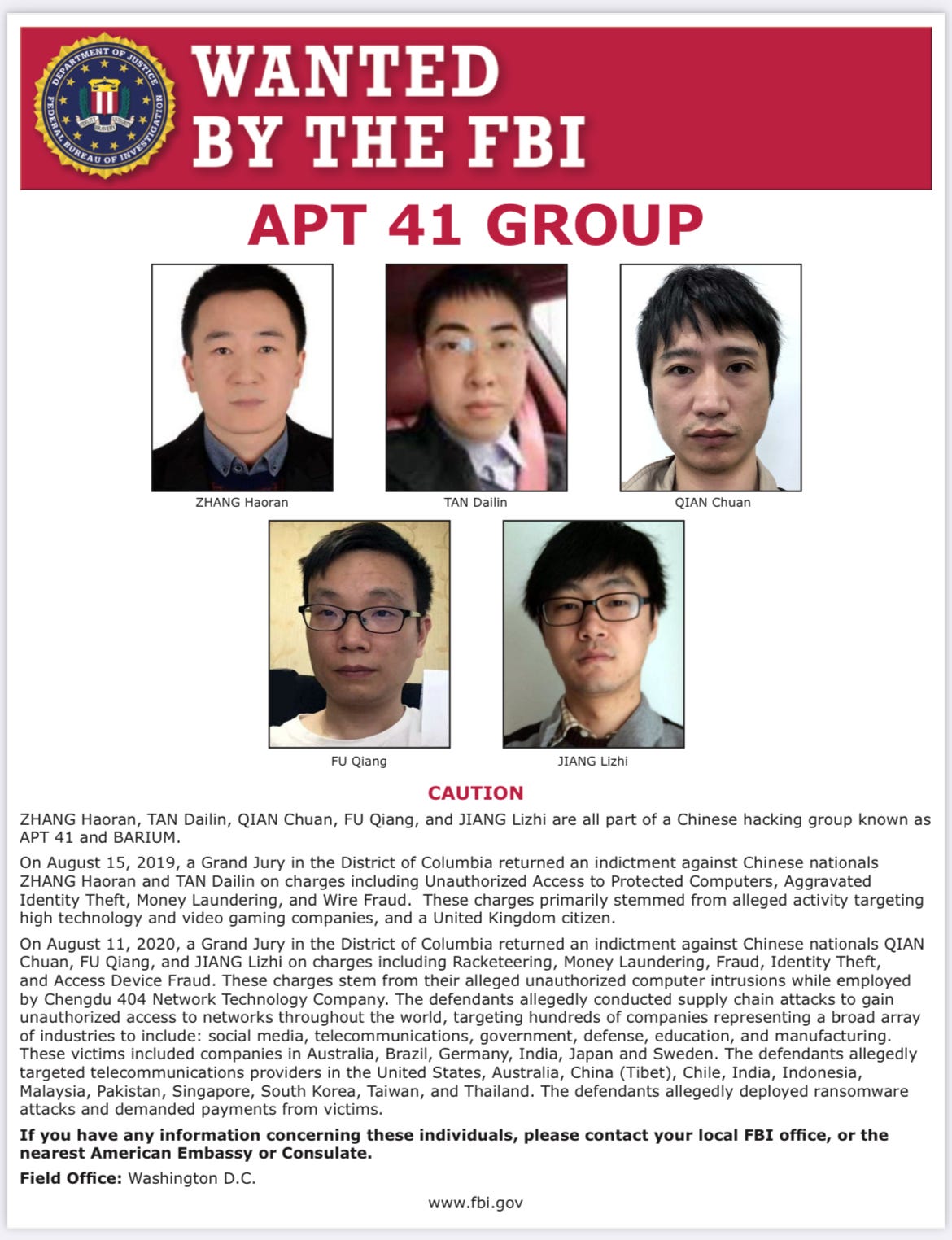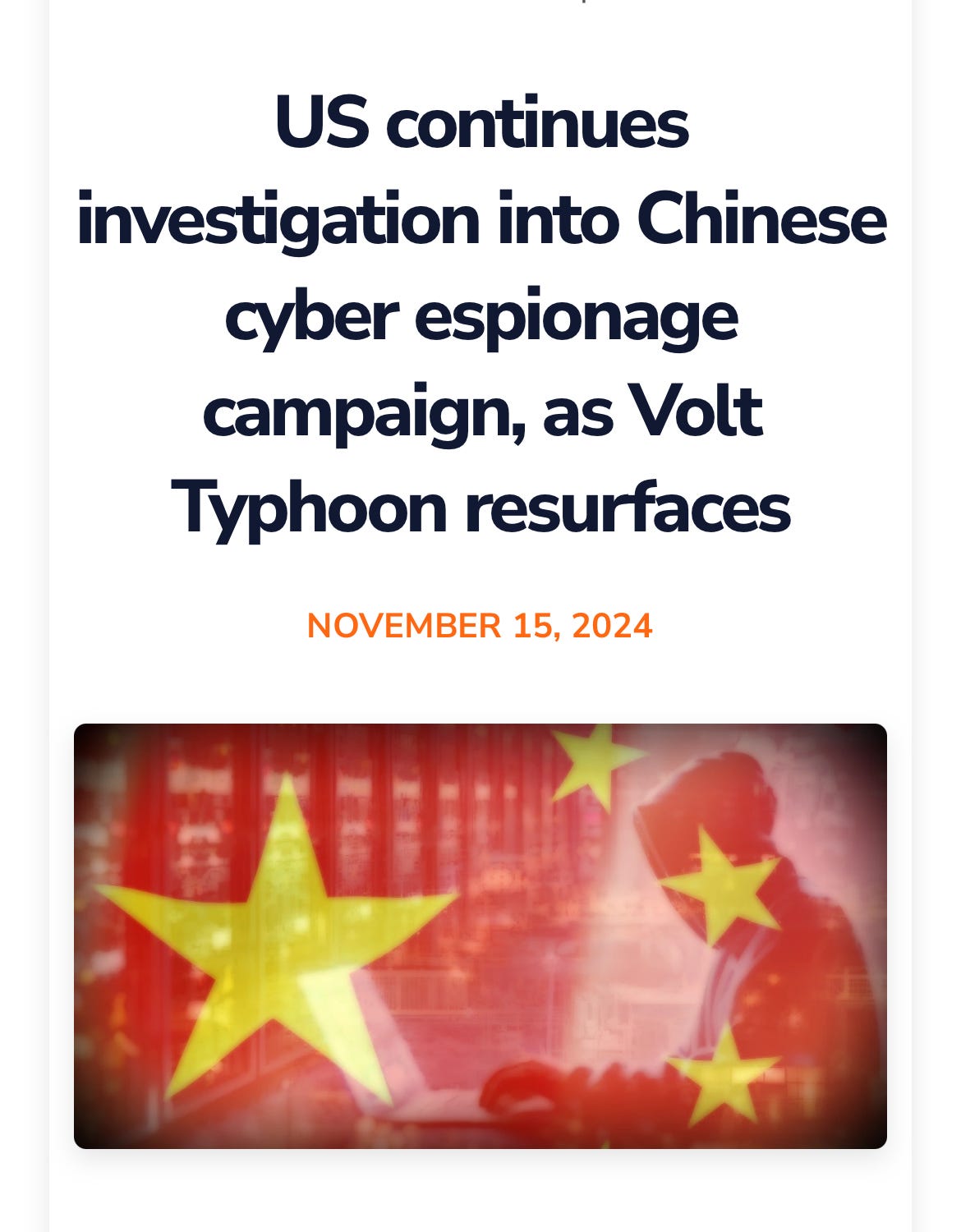Chinese Espionage Cases in the U.S. Are On the Rise
According to multiple sources, the cases of Chinese Espionage are on the rise. Many of these cases are tied to the CCP &involve trade secrets and economic espionage. Let’s discuss this alarming trend.
If you enjoy a good espionage novel or spy movies, you will probably enjoy this post. The truth is stranger than fiction, at times. This is some real ‘spy stuff’ occurring, here in the United States, especially in recent years. Everything from breaking and entering into a steel plant in the Midwest to cyber attacks to infrastructure espionage. Let’s discuss the types of espionage and how they violate U.S laws and some real examples. Let’s dive in.
Espionage is the act of spying or secretly gathering secret information, usually through illegal means, for the purpose of transferring such information to another organization or state. Under U.S. law, espionage can be categorized into several types, including:
Military Espionage:
This involves the act of obtaining, delivering, transmitting, communicating, or receiving information about the national defense with the intent or reason to believe that the information may be used to the injury of the United States or to the advantage of any foreign nation. It is covered by the Espionage Act of 1917.
Economic Espionage:
This type of espionage involves the clandestine gathering of information from an economic competitor to benefit a foreign government or entity. It is addressed by the Economic Espionage Act of 1996.
Cyber Espionage:
This involves using computer systems to steal classified information, often government secrets, which might be related to foreign policy, military technology, or personal information about individuals.
The Espionage Act of 1917, passed shortly after the U.S. entered World War I, criminalizes the release of information that could harm national security and causing insubordination or disloyalty in the military.
The Economic Espionage Act of 1996 (EEA) is a federal law in the United States that criminalizes the theft of trade secrets and foreign economic espionage. The act was enacted on October 11, 1996, by the 104th United States Congress. Key provisions include; protection of trade secrets and infrastructure protection.
According to a survey of Chinese espionage in the United States since 2000, there have been 224 reported instances of Chinese espionage directed at the United States since 2000, with 69% of these incidents reported after Xi Jinping took office in 2013. The survey indicates that the number of incidents has been increasing, with a significant number of reported cases in recent years.
Additionally, a House report from February 2025 mentioned that more than 60 Chinese Communist Party-related cases of espionage and acts of transnational repression have been reported in 20 states during recent years.
Incidents of Chinese Corporate Espionage
A highly sophisticated and targeted cyberattack originating from China targeted Google and over 20 other companies, resulting in the theft of intellectual property. Exbeam reports the following:
“…..the breach appears to have been aimed at identifying Chinese intelligence operatives in the US who may have been under surveillance by American law enforcement agencies. It’s said the Aurora hackers gained access to certain Google accounts that had US court-ordered wiretaps.”~Exbeam
Indictment of Chinese Military Officers (2014):
In May 2014, a U.S. federal grand jury indicted five Chinese military officers - Wang Dong, Sun Kailiang, Wen Xinyu, Huang Zhenyu, and Gu Chunhui, all members of Unit 61398 of the Chinese People's Liberation Army - for cyber espionage and stealing trade secrets. The officers were accused and charged with 31 counts of espionage for hacking into the computers of six U.S. companies and stealing confidential business information and intellectual property. Those six U.S. companies and unions, includes U.S. Steel, Westinghouse Electric, and United Steel Workers. They were indicted but never convicted of espionage charges. The indictment was more of a symbolic and diplomatic move to highlight the U.S. government's stance on state-sponsored cyber espionage.
Two Chinese nationals were charged in federal court with attempting to pay $100,000 for stolen trade secrets from Pittsburgh Corning, which has a manufacturing plant in Sedalia, Missouri, that produces FOAMGLAS. Later, in January 2015, Ji Li Huang and Xiao Guang Qi pleaded guilty and were sentenced for conspiring to steal trade secrets from Pittsburgh Corning Corporation. Ji Li Huang, the CEO of Ningbo Oriental Crafts Ltd., was sentenced to 18 months in federal prison and fined $250,000 and was deported after serving his sentence. Qi, an employee of Huang, was sentenced to time served and fined $20,000, with the condition that he would leave the United States immediately. Both men paid their fines on the day of sentencing.
Xiang Haitao, a Chinese national formerly residing in Chesterfield, Missouri, pleaded guilty to conspiracy to commit economic espionage, against the parent company of his former employer, Climate Corporation, Monsanto in 2022. He was accused of stealing a predictive algorithm, called a Nutrient Optimizer, used in a software program for farmers. In February of 2025, Xiang Haitao, was sentenced to 29 months in prison followed by three years of supervised release and a $150,000 fine. The Guardian reports the following:
“Despite Xiang’s agreements to protect Monsanto’s intellectual property and repeated training on his obligations to do so, Xiang has now admitted that he stole a trade secret from Monsanto, transferred it to a memory card and attempted to take it to the People’s Republic of China for the benefit of the Chinese government,” assistant attorney general Matthew Olsen said.
According to Xiang’s attorney, he has already served the entire 29 months of his sentence while in federal custody. Upon completion of his sentence, Xiang is likely to be deported from the United States.
In July 2024, Mandiant reported a major resurgence in malware attacks by APT 41, a notorious hacking group backed by the Chinese government, that has direct links to the CCP. The group targeted organizations in the shipping, logistics, technology, and automotive industries across Europe and Asia. Since June of 2024, the Chinese threat actor, has marked a 900% increase in cyberattacks around the world, including the United States. Their intelligence gathering operations are said to be used by the CCP to shape geopolitical responses and specific long term military and diplomatic interventions. The five members charged are Zhang Haoran, Tan Dailin, Jiang Lizhi, Qian Chuan, and Fu Qiang. All five remain at large and their names have been added to the FBI's Cyber Most Wanted List. Additionally, two Malaysian businessmen, Wong Ong Hua and Ling Yang Ching, were arrested in September 2020 for conspiring with two of the APT41 members to profit from intrusions at video game companies. They were arrested by Malaysian authorities in Sitiawan and are awaiting extradition to the United States to face their charges.
Volt Typhoon is a state-sponsored cyber group from the People's Republic of China (PRC) that has been targeting critical infrastructure in the United States and other countries since at least 2021. The group uses "Living Off the Land" techniques, which involve using legitimate tools and features already present in the target system to maintain long-term, undiscovered persistence. The group has targeted various sectors, including aviation, rail, mass transit, highway, maritime, pipeline, water, sewage, and communications systems. This may speak to some recent efforts to ban foreign farm land purchases in various U.S. states, particularly those located near vital infrastructure or military bases.
In January 2024, U.S. authorities stated that they disrupted the KV Botnet malware used by Volt Typhoon to target small offices and home offices. However, the group quickly rebuilt its botnet and continues to exploit vulnerabilities in end-of-life devices to maintain access to critical infrastructure networks.
The most recent attack by the Chinese threat actor was on a Massachusetts Power Utility Company, Little Electric Light and Water Departments (LELWD), in March 2025. The attack lasted over 300 days and aimed to exfiltrate sensitive data related to the operational technology (OT) infrastructure.
No specific charges or indictments are publicly available on the members of Volt Typhoon, but it’s clear they are on the FBI’s radar and continue to be a cybersecurity threat on United States infrastructure.
Yanjun Xu, a Chinese national and Deputy Division Director of the Jiangsu Province Ministry of State Security, was convicted of conspiring to and attempting to commit economic espionage and theft of trade secrets, against multiple aviation companies and sentenced to 20 years. He is the first Chinese intelligence officer to be extradited to the United States to stand trial. He is currently serving his time in a federal prison.
Zhang, a Chinese national and a professor at Tianjin University in China, was found guilty of economic espionage, theft of trade secrets, and conspiring to commit both offenses against two United States companies; Avago & Skyworks. He was sentenced to 18 months in prison in September 2020 and ordered to pay $476,835 in restitution. The Department of Justice reported the following:
“Hao Zhang committed these acts to benefit himself, his co-conspirators, and the government of China. This is not competition – this is economic espionage, theft, and conspiracy,” said FBI Special Agent in Charge, Bennett. “The FBI will not allow American research and development to be stolen. We encourage companies to come to us both proactively and when suspicious activity is observed so that we can work together to protect American businesses and ensure our national economic security.”
Huawei CFO Wanzhou Meng (2022):
Wanzhou Meng, the Chief Financial Officer of Huawei Technologies Co. Ltd., appeared in federal district court in Brooklyn to enter into a deferred prosecution agreement (DPA) and was arraigned on charges of conspiracy to commit bank fraud and wire fraud. The DOJ reports the following:
“In entering into the deferred prosecution agreement, Meng has taken responsibility for her principal role in perpetrating a scheme to defraud a global financial institution,” said Acting U.S. Attorney Nicole Boeckmann for the Eastern District of New York.
In December 2022, the U.S. Department of Justice ended its case against Meng, dismissing the indictment against her with prejudice, meaning the matter cannot return to court. Meng has returned to China and still maintains her leadership position as CFO for Huawei Technologies.
These cases highlight some of the different types of espionage cases occurring in the United States, particularly by the PRC and the CCP, which includes the transmission of sensitive military information, the stealing of trade secrets, the execution of transnational repression schemes, and the obstruction of justice. According to the FBI, about 80 percent of economic espionage prosecutions allege conduct that would benefit China, and there is at least some nexus to China in around 60 percent of all trade secret theft cases.















Doesn’t China have many students attending college here? Also rumor has it many of the illegal aliens single young men have crossed our once open border. This if true is suspicious. Adding to this the Chinese balloon that was eventually shot down. And China owning property next to military bases.
From the media you don’t hear China is the enemy but Russia Russia Russia is which I’m assuming China is the enemy.